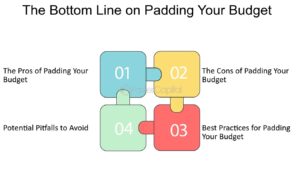In governance and financial management, “budget padding” stands out as a critical issue, particularly in developing economies where it significantly impacts governance and development. This blog post delves into the meaning of budget padding, focusing on Nigeria, to explore its implications on the country’s governance, economy, and public trust.
What is Budget Padding?

Budget padding refers to the illicit practice of inflating budgetary figures by government officials before approval. This inflation can be for personal enrichment or to inflate the cost of projects without intending to execute them fully. It’s a form of corruption that undermines transparency and accountability in governance.
The Nigerian Context: A Historical Overview
Nigeria, Africa’s largest economy, has had its share of budget padding scandals that have rocked the nation. The complexity of the Nigerian budgetary process, combined with less-than-ideal transparency levels, creates a fertile ground for budget padding. Over the years, various administrations have faced allegations of budget manipulation, casting a shadow over the country’s development efforts.
The Impact of Budget Padding on Nigeria
The implications of budget padding in Nigeria are multifaceted:
• Economic Effects: Misallocation of resources and hindrance to development projects, contributing to the country’s infrastructural deficit.
• Social Implications: Loss of public trust in governance, as citizens grow weary of the corruption and mismanagement of public funds.
• Sectoral Impact: Key sectors like healthcare, education, and infrastructure are often the most affected, with diverted funds leading to inadequate services and facilities.
Case Studies: Notable Instances
One notable instance is the 2016 budget padding scandal involving top officials and lawmakers. Accusations of inserting fraudulent projects and figures into the national budget led to widespread public outcry and called for greater scrutiny and reforms in the budgeting process.
Combating Budget Padding: Strategies and Challenges
Combating budget padding requires a multifaceted approach, including:
• Strengthening Institutions: Enhancing the independence and capacity of anti-corruption agencies.
• Enhancing Transparency: Implementing open budgeting systems to allow public scrutiny of government expenditures.
• Legislative Reforms: Enacting laws that provide stiffer penalties for budget-related offenses.
Is it a Good Thing or a Bad Thing?
Budget padding remains a significant challenge in Nigeria, undermining the country’s development and the trust of its citizens in governance. Addressing this issue is crucial for promoting transparency, accountability, and sustainable development. As Nigeria continues to evolve, the fight against budget padding and corruption will be pivotal in shaping the nation’s future.
This abbreviated version offers a snapshot of the complex issue of budget padding in Nigeria, focusing on its definition, impact, and the efforts to combat it. For a complete analysis, one would need to delve deeper into each section, providing more detailed case studies, statistical data, and exploring the broader implications of these practices on Nigeria’s socio-economic development.



